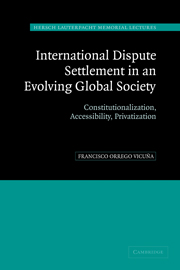 International Dispute Settlement in an Evolving Global Society
International Dispute Settlement in an Evolving Global Society Published online by Cambridge University Press: 04 August 2010
Emerging trends in a global society
It has been pointed out above that the current process of economic globalization is having a potentially decisive impact on the structure of international society and the evolving role of international law. A particular expression of this development is the prominent role assumed by the individual in international dispute settlement related to such globalization. This role has already been well established in the context of investment disputes and is beginning to permeate the arrangements for dispute settlement in international trade, economic integration and other specialized forms of jurisdiction, the most relevant of which will be examined in this chapter.
A highly influential factor in this process is the role of market economies in the context of globalization, which constitutes a common thread underlying most of the new dispute settlement arrangements. As Shihata has explained with regard to national dispute settlement arrangements:
The settlement of disputes through adequate institutions acquires a unique importance in the context of transition from a command economy to a market economy. In the former, the function of dispute-settlement institutions is perhaps akin to an administrative one, mostly concerned with the timely fulfillment of an economic plan. In a market economy, by contrast, economic actors will be left, within certain limits defined by law, to pursue their own economic strategies. Long-term success of those strategies will depend on a climate of stability and predictability, where business risks may be rationally assessed, transaction costs lowered, market failures addressed and governmental arbitrariness reduced. In such a context, fair and efficient dispute settlement institutions will be required as an integral part of the legal framework.
To save this book to your Kindle, first ensure [email protected] is added to your Approved Personal Document E-mail List under your Personal Document Settings on the Manage Your Content and Devices page of your Amazon account. Then enter the ‘name’ part of your Kindle email address below. Find out more about saving to your Kindle.
Note you can select to save to either the @free.kindle.com or @kindle.com variations. ‘@free.kindle.com’ emails are free but can only be saved to your device when it is connected to wi-fi. ‘@kindle.com’ emails can be delivered even when you are not connected to wi-fi, but note that service fees apply.
Find out more about the Kindle Personal Document Service.
To save content items to your account, please confirm that you agree to abide by our usage policies. If this is the first time you use this feature, you will be asked to authorise Cambridge Core to connect with your account. Find out more about saving content to Dropbox.
To save content items to your account, please confirm that you agree to abide by our usage policies. If this is the first time you use this feature, you will be asked to authorise Cambridge Core to connect with your account. Find out more about saving content to Google Drive.